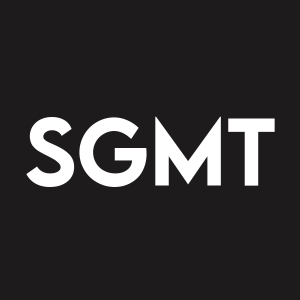Sagimet Biosciences Announces Positive Phase 3 Results for Denifanstat for the Treatment of Moderate-to-Severe Acne from Partner Ascletis
Rhea-AI Summary
Positive
- Met all primary and secondary endpoints in Phase 3 trial with strong efficacy data
- Significant treatment success rate of 33.2% vs 14.6% for placebo (p<0.0001)
- Well-tolerated safety profile with only mild to moderate side effects
- Novel oral treatment mechanism addressing a market of 640 million people worldwide
- Initiated Phase 1 trial for second FASN inhibitor (TVB-3567) expanding pipeline
Negative
- Limited to China market through Ascletis partnership
- Some side effects reported including dry skin (6.3%) and dry eye (5.9%)
- Treatment success rate of 33.2% may be considered moderate
News Market Reaction
On the day this news was published, SGMT gained 12.40%, reflecting a significant positive market reaction.
Data tracked by StockTitan Argus on the day of publication.
Denifanstat met all primary and secondary endpoints versus placebo
Denifanstat was well tolerated
Oral FASN inhibitors offer a novel mechanism of action for the potential treatment of moderate to severe acne
Sagimet initiated first-in-human Phase 1 clinical trial of a second FASN inhibitor, TVB-3567, that is planned to be developed for acne in the U.S.
SAN MATEO, Calif., June 04, 2025 (GLOBE NEWSWIRE) -- Sagimet Biosciences Inc. (Nasdaq: SGMT), a clinical-stage biopharmaceutical company developing novel therapeutics targeting dysfunctional metabolic and fibrotic pathways, today reported denifanstat met all primary and secondary endpoints in a Phase 3 clinical trial for the treatment of moderate to severe acne vulgaris conducted by Sagimet’s license partner Ascletis Bioscience Co. Ltd. (Ascletis) in China. Denifanstat is a once-daily oral small molecule fatty acid synthase (FASN) inhibitor being developed by Ascletis as ASC40 for acne in China and by Sagimet for MASH in the rest of world. Additionally, Sagimet recently initiated a Phase 1 first-in-human clinical trial with a second FASN inhibitor, TVB-3567, that is planned to be developed for acne in the US.
“We are highly encouraged by the positive results from Ascletis’ Phase 3 acne trial in China,” said David Happel, Chief Executive Officer of Sagimet. “FASN inhibition represents a novel potential approach to treat moderate to severe acne vulgaris, a widespread condition impacting more than 640 million people worldwide. These positive data support the rationale for our development of our FASN inhibitor TVB-3567 for moderate-to-severe acne and add to the body of evidence of the broad consequences of unchecked overactivity of FASN.”
“It is very exciting to see this novel oral acne product candidate progressing through development in light of the limited innovation within the acne space over the past 40 years,” said Dr. Neal Bhatia, Director of Clinical Dermatology at Therapeutics Clinical Research in San Diego and a past Vice President of the American Academy of Dermatology. “These data demonstrate the significant clinical response that a FASN inhibitor can achieve for moderate to severe acne patients by addressing the overproduction of sebum and the inflammatory cascade, two of the primary pathways of acne, and most importantly through a novel mechanism of action. With currently available treatments either showing limited efficacy, high potential for irritation, or risks of antibiotic resistance, control of acne through new modes of action is more critical now than ever.”
Over 50 million people suffer from acne in the US, making it one of the most prevalent skin diseases that physicians address annually. Patients with acne vulgaris have increased sebum production compared to non-acne populations which contributes to the pathogenesis of the disease. Increased sebum production is due to increased de novo lipogenesis (DNL) locally in the sebocytes. FASN is the last committed step in the DNL pathway which produces the majority (>
Clinical Results
The Phase 3 clinical trial (NCT06192264) was a randomized, double-blind, placebo-controlled, multicenter clinical trial in China to evaluate the safety and efficacy of denifanstat for the treatment of patients with moderate to severe acne. The 480 enrolled patients were randomized 1:1 into two treatment arms to receive denifanstat 50mg or placebo, once daily for 12 weeks.
- Primary endpoints included the percentage of treatment success (defined as an Investigator’s Global Assessment (IGA) score of 0 (clear) or 1 (almost clear) with at least a 2-point decrease from baseline), the percentage change in total lesion count, and the percentage change in inflammatory lesion count.
- Ascletis reported that denifanstat met all the primary and secondary endpoints. Efficacy results are summarized in Table 1 below.
Table 1: Efficacy data from Phase 3 trial of Denifanstat (ASC40) in acne vulgaris
| Endpoints | 50mg denifanstat, oral, once daily (n=240) | Placebo, oral, once daily (n=240) | Placebo adjusted | p value |
| % Treatment success (IGA) | 33.2 | 14.6 | 18.6 | <0.0001 |
| % Change in total lesion count | -57.4 | -35.4 | -22.0 | <0.0001 |
| % Change in inflammatory lesion count | -63.5 | -43.2 | -20.3 | <0.0001 |
| % Change in non-inflammatory lesion count | -51.9 | -28.9 | -23.0 | <0.0001 |
| Absolute change in total lesion count | -58.3 | -36.2 | -22.1 | <0.0001 |
| Absolute change in inflammatory lesion count | -26.6 | -18.4 | -8.2 | <0.0001 |
Source: Ascletis Press Release issued June 3rd, 2025
Ascletis reported that denifanstat was generally well-tolerated. Following 12 weeks of once-daily oral administration at 50 mg, the incidence rates of treatment-emergent adverse events (TEAE) were comparable between denifanstat and placebo. No incidence rate of TEAEs in any category exceeded
These Phase 3 results confirm that FASN inhibition represents a potential therapeutic approach within acne. Ascletis has indicated that it plans to submit denifanstat for approval to the China National Medical Products Administration. Building on Ascletis’ positive Phase 3 results, Sagimet has recently initiated a Phase 1 first-in-human clinical trial with a second oral FASN inhibitor drug candidate, TVB-3567, that is planned to be developed for acne in the U.S.
About Sagimet Biosciences
Sagimet is a clinical-stage biopharmaceutical company developing novel fatty acid synthase (FASN) inhibitors that are designed to target dysfunctional metabolic and fibrotic pathways in diseases resulting from the overproduction of the fatty acid, palmitate. Sagimet’s lead drug candidate, denifanstat, is an oral, once-daily pill and selective FASN inhibitor in development for the treatment of metabolic dysfunction associated steatohepatitis (MASH). FASCINATE-2, a Phase 2b clinical trial of denifanstat in MASH with liver biopsy-based primary endpoints, was successfully completed with positive results. Denifanstat has been granted Breakthrough Therapy designation by the FDA for the treatment of non-cirrhotic MASH with moderate to advanced liver fibrosis (consistent with stages F2 to F3 fibrosis), and end-of-Phase 2 interactions with the FDA have been successfully completed, supporting the advancement of denifanstat into further development. Sagimet has recently initiated a Phase 1 first-in-human clinical trial with a second oral FASN inhibitor drug candidate, TVB-3567, that is planned to be developed for acne in the US. For additional information about Sagimet, please visit www.sagimet.com.
About Acne
There are 5.1 million acne patients in the U.S. who are treated by dermatologists annually, and a total U.S. acne market of over 50 million people. 1,2 There is no cure for acne; and due to its pathology, most patients require chronic management and multiple courses of treatment for flare control annually. Additionally, adherence to topical therapies is lower than with oral agents, with an estimated
- Bickers DR, Lim HW, Margolis D, Weinstock MA, Goodman C, Faulkner E et al. The burden of skin diseases: 2004 a joint project of the American Academy of Dermatology Association and the Society for Investigative Dermatology. Journal of the American Academy of Dermatology 2006;55:490-500.
- American Academy of Dermatology/Milliman. Burden of Skin Disease. 2017. www.aad.org/BSD.
- Purvis CG, Balogh EA, Feldman SR. Clascoterone: How the Novel Androgen Receptor Inhibitor Fits Into the Acne Treatment Paradigm. Ann Pharmacother. 2021;55(10):1297-1299. doi:10.1177/1060028021992055.
Forward-Looking Statements
This press release contains forward-looking statements within the meaning of, and made pursuant to the safe harbor provisions of, The Private Securities Litigation Reform Act of 1995. All statements contained in this press release, other than statements of historical facts or statements that relate to present facts or current conditions, including but not limited to, statements regarding: the expected timing of the presentation of data from ongoing clinical trials, Sagimet’s clinical development plans and related anticipated development milestones, Sagimet’s cash and financial resources and expected cash runway. These statements involve known and unknown risks, uncertainties and other important factors that may cause Sagimet’s actual results, performance or achievements to be materially different from any future results, performance or achievements expressed or implied by the forward-looking statements. In some cases, these statements can be identified by terms such as “may,” “might,” “will,” “should,” “expect,” “plan,” “aim,” “seek,” “anticipate,” “could,” “intend,” “target,” “project,” “contemplate,” “believe,” “estimate,” “predict,” “forecast,” “potential” or “continue” or the negative of these terms or other similar expressions.
The forward-looking statements in this press release are only predictions. Sagimet has based these forward-looking statements largely on its current expectations and projections about future events and financial trends that Sagimet believes may affect its business, financial condition and results of operations. These forward-looking statements speak only as of the date of this press release and are subject to a number of risks, uncertainties and assumptions, some of which cannot be predicted or quantified and some of which are beyond Sagimet’s control, including, among others: the clinical development and therapeutic potential of denifanstat or any other drug candidates Sagimet may develop; Sagimet’s ability to advance drug candidates into and successfully complete clinical trials within anticipated timelines; Sagimet’s relationship with Ascletis, and the success of its development efforts for denifanstat; the accuracy of Sagimet’s estimates regarding its capital requirements; and Sagimet’s ability to maintain and successfully enforce adequate intellectual property protection. These and other risks and uncertainties are described more fully in the “Risk Factors” section of Sagimet’s most recent filings with the Securities and Exchange Commission and available at www.sec.gov. You should not rely on these forward-looking statements as predictions of future events. The events and circumstances reflected in these forward-looking statements may not be achieved or occur, and actual results could differ materially from those projected in the forward-looking statements. Moreover, Sagimet operates in a dynamic industry and economy. New risk factors and uncertainties may emerge from time to time, and it is not possible for management to predict all risk factors and uncertainties that Sagimet may face. Except as required by applicable law, Sagimet does not plan to publicly update or revise any forward-looking statements contained herein, whether as a result of any new information, future events, changed circumstances or otherwise.
Investor Contact:
Joyce Allaire
LifeSci Advisors
JAllaire@LifeSciAdvisors.com
Media Contact:
Michael Fitzhugh
LifeSci Advisors
mfitzhugh@lifescicomms.com








